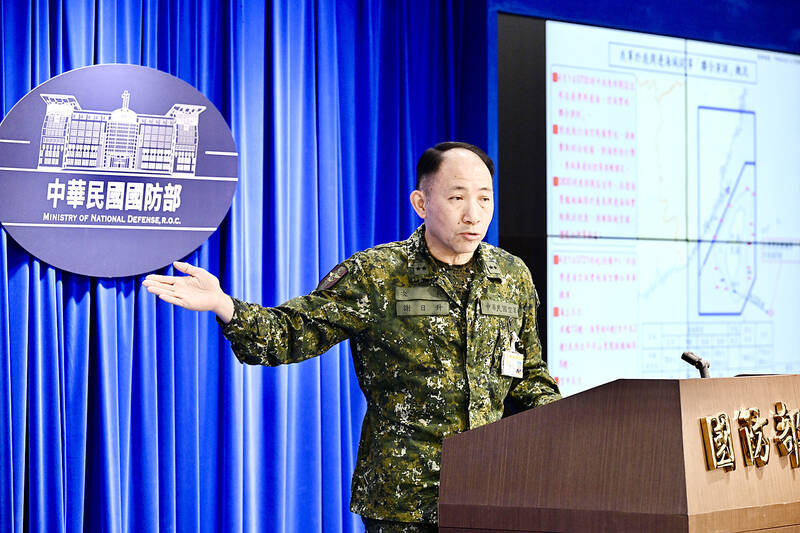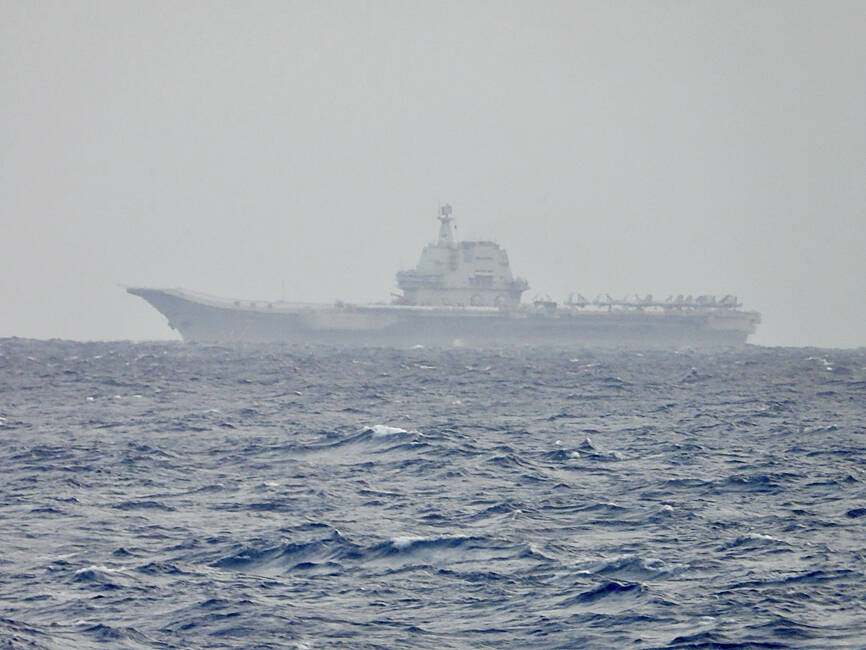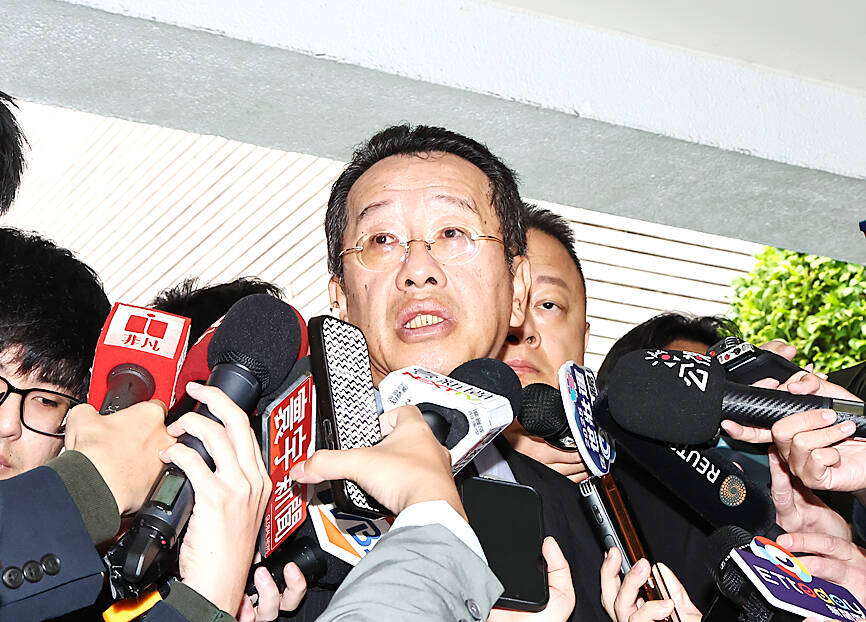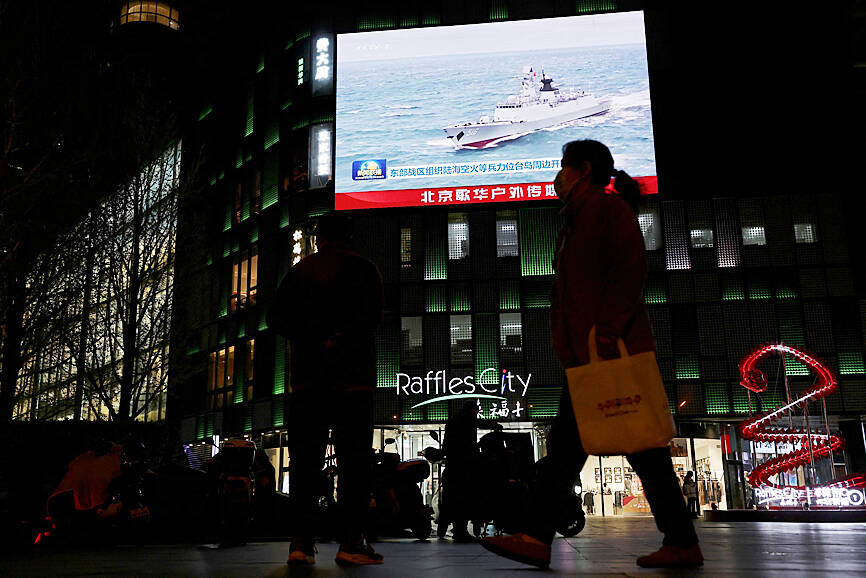The Presidential Office yesterday denounced the Chinese People’s Liberation Army (PLA) for launching joint military drills around Taiwan, calling Beijing a “troublemaker.”
The condemnation came after the PLA’s Eastern Theater Command yesterday morning announced the start of a new round of joint exercises around Taiwan, featuring the army, navy, air and rocket forces to “close in” on Taiwan from “multiple directions.”
The exercises served as “a stern warning” to “Taiwan independence” separatist forces, China’s Taiwan Affairs Office said.

Photo: Lo Pei-de, Taipei Times
As of 3pm yesterday, the PLA’s Eastern Theater Command said it had conducted drills in waters to the north, south and east of Taiwan, featuring “air interception, assault on maritime targets, strikes on ground objects, and joint blockade and control,” adding that these drills were aimed at testing troops’ capabilities in carrying out integrated operations, seizure of operational control and multidirectional precision strikes.
Condemning the exercises, the Presidential Office in a statement said that China has continued to “engage in military provocations and gray zone tactics” in the Taiwan Strait and the Indo-Pacific region.
China is “a troublemaker,” unilaterally escalating the regional situation and blatantly challenging the international order, it added.

Photo: Ministry of National Defense via AP
“China’s blatant military provocations not only threaten peace in the #Taiwan Strait but also undermine security in the entire region, as evidenced by drills near Australia, New Zealand, Japan, [South] Korea, the Philippines & the SCS. We strongly condemn China’s escalatory behavior,” the Presidential Office said in a message on the social media platform X.
The SCS refers to the South China Sea, the strategic waterway that China claims almost in its entirety. The Chinese navy also recently held drills near Australia and New Zealand for which it gave no warning, forcing the last-minute rerouting of commercial flights.
The Ministry of Foreign Affairs in a statement also condemned the Chinese drills, “again challenging the rules-based international order, unilaterally and severely damaging peace and stability across the Taiwan Strait and the [Indo-Pacific] region.”

Photo: CNA
The US is closely monitoring China’s military activity near Taiwan and will continue to support Taiwan in the face of Beijing’s military, economic and diplomatic pressure, a US Department of State spokesperson said yesterday.
“China has shown that it is not a responsible actor and has no problem putting the region’s security and prosperity at risk. There is no justification for China’s irresponsible threats and military pressure operations near Taiwan,” the spokesperson said.
The EU yesterday also accused China of increasing cross-strait tensions by holding military drills around Taiwan, and called on all parties to "exercise restraint."

Photo: Reuters
"China’s large-scale military drills around Taiwan are increasing cross-strait tensions," EU Foreign Affairs and Security Policy lead spokesperson Anitta Hipper said. "We
call on all parties to exercise restraint and avoid any actions that may further escalate tensions, which should be resolved through cross-strait dialogue."
Earlier yesterday, Minister of National Defense Wellington Koo (顧立雄) said the defense ministry had established a “response center” earlier that day to monitor the PLA exercises.
The ministry has been monitoring related PLA activities since Saturday, Koo added.
At an emergency press briefing later yesterday to make public the government’s response to the latest round of drills, which began at 7:30am, the ministry said that as of yesterday afternoon, it had detected 13 PLA naval vessels, four coast guard vessels and 71 military aircraft operating around Taiwan.
Among the 71, 36 crossed the Taiwan Strait median line, said Lieutenant General Hsieh Jih-sheng (謝日升), head of the ministry’s Office of the Deputy Chief of General Staff for Intelligence.
On the eastern side of Taiwan, Hsieh said that the military had identified an eight-vessel naval fleet led by the Shandong aircraft carrier operating in the Pacific Ocean about 220 nautical miles (407km) southeast of Oluanpi (鵝鑾鼻), the southernmost point of Taiwan proper.
Asked how close the Chinese military was, Hsieh said none of the PLA warplanes and warships had entered the nation’s contiguous zone, an area that is adjacent to territorial sea and airspace, and extends a maximum of 24 nautical miles from the coast.
The military has also not detected live-fire drills by the PLA forces, he said, adding that the military could not predict when the latest round of exercises would conclude.
The PLA’s ongoing drills are part of China’s years-long “gray zone” harassment of the country, he said.
Major General Tung Chi-hsing (董冀星), director of the ministry’s joint operations planning division, said the armed forces have established an ad hoc emergency operations center and deployed military aircraft, vessels and coastal missile systems following the PLA’s announcement of drills early yesterday.
The military is conducting patrols and monitoring Chinese troops, Tung said.
The armed forces would adjust their combat readiness level based on the level of the PLA threats, he added.
Meanwhile, the Coast Guard Administration (CGA) said that at about the same time the PLA Eastern Theater Command issued a statement about the drills yesterday, it detected China Coast Guard vessels 14607 and 14517 approaching Dongyin Island (東引), which is part of Lienchiang County.
The CGA dispatched vessels in response to the ships, which the China Coast Guard claimed were “conducting law enforcement patrols.”
Additional reporting by Lee I-chia

NATIONAL SECURITY THREAT: An official said that Guan Guan’s comments had gone beyond the threshold of free speech, as she advocated for the destruction of the ROC China-born media influencer Guan Guan’s (關關) residency permit has been revoked for repeatedly posting pro-China content that threatens national security, the National Immigration Agency said yesterday. Guan Guan has said many controversial things in her videos posted to Douyin (抖音), including “the red flag will soon be painted all over Taiwan” and “Taiwan is an inseparable part of China,” while expressing hope for expedited “reunification.” The agency received multiple reports alleging that Guan Guan had advocated for armed reunification last year. After investigating, the agency last month issued a notice requiring her to appear and account for her actions. Guan Guan appeared as required,

A strong cold air mass is expected to arrive tonight, bringing a change in weather and a drop in temperature, the Central Weather Administration (CWA) said. The coldest time would be early on Thursday morning, with temperatures in some areas dipping as low as 8°C, it said. Daytime highs yesterday were 22°C to 24°C in northern and eastern Taiwan, and about 25°C to 28°C in the central and southern regions, it said. However, nighttime lows would dip to about 15°C to 16°C in central and northern Taiwan as well as the northeast, and 17°C to 19°C elsewhere, it said. Tropical Storm Nokaen, currently

‘NATO-PLUS’: ‘Our strategic partners in the Indo-Pacific are facing increasing aggression by the Chinese Communist Party,’ US Representative Rob Wittman said The US House of Representatives on Monday released its version of the Consolidated Appropriations Act, which includes US$1.15 billion to support security cooperation with Taiwan. The omnibus act, covering US$1.2 trillion of spending, allocates US$1 billion for the Taiwan Security Cooperation Initiative, as well as US$150 million for the replacement of defense articles and reimbursement of defense services provided to Taiwan. The fund allocations were based on the US National Defense Authorization Act for fiscal 2026 that was passed by the US Congress last month and authorized up to US$1 billion to the US Defense Security Cooperation Agency in support of the

PAPERS, PLEASE: The gang exploited the high value of the passports, selling them at inflated prices to Chinese buyers, who would treat them as ‘invisibility cloaks’ The Yilan District Court has handed four members of a syndicate prison terms ranging from one year and two months to two years and two months for their involvement in a scheme to purchase Taiwanese passports and resell them abroad at a massive markup. A Chinese human smuggling syndicate purchased Taiwanese passports through local criminal networks, exploiting the passports’ visa-free travel privileges to turn a profit of more than 20 times the original price, the court said. Such criminal organizations enable people to impersonate Taiwanese when entering and exiting Taiwan and other countries, undermining social order and the credibility of the nation’s